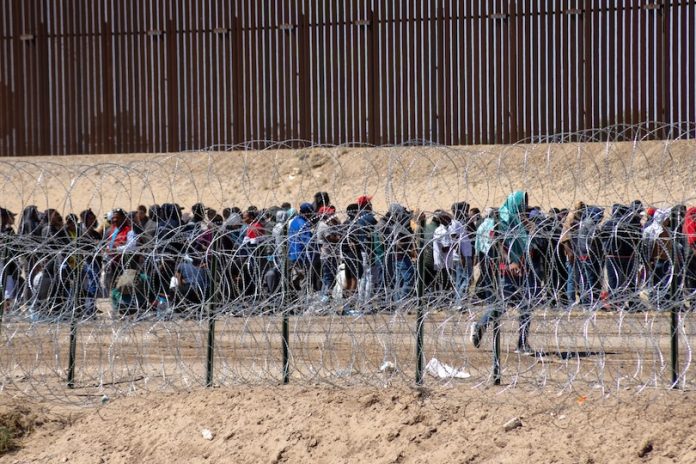Since the 2000s, migration and asylum have become prominent topics in diplomatic discussions and actions. In 2023, the European Union highlighted the importance of migration in its foreign policy statement, noting the militarization of borders and the use of migration for political gains. Migration diplomacy is not just a response to globalization or strategic interests, but a way to challenge the fundamentals of statehood, violence, and international relations. This form of diplomacy involves using migration for diplomatic purposes, as well as controlling different types of mobility through diplomatic instruments.
Controlling migration can serve both as a means and an end of diplomacy, with various formal and informal instruments used at different levels. Migration diplomacy plays a critical role in rethinking the dynamics between control and sovereignty, cooperation and conflict, and the relationship between domestic and foreign policy.
Genealogies of migration diplomacy: Diasporic state building and free circulation
The term “migration diplomacy” emerged in the early 2000s in response to restrictive immigration policies in Europe and North America. However, its origins can be traced back to the diplomatic history of African and Middle Eastern countries, where migration was seen as a strategic and economic resource. The Eritrean case is a notable example of migration diplomacy, where refugee diasporas were used to support the war effort and gain political and financial backing. Similar strategies have been observed in Kurdish, Palestinian, Armenian, and Jewish diaspora cases, showcasing the entanglement of protection and diplomatic leveraging through migration.
Migration diplomacy is not limited to sending countries but also involves destination countries, such as the Gulf monarchies. These countries have used migrants and refugees strategically to meet labor needs and promote regional integration. The diplomatic efforts of African countries have institutionalized the diplomacy of asylum and circulation through treaties focusing on refugee problems and free movement of persons.
While migration diplomacy is often associated with Western policies, its roots lie in non-Western contexts where migration and asylum are viewed as tools for state formation, regional cooperation, and integration. The conversation around migration diplomacy has shifted towards restrictions and border control, but its historical significance in non-Western contexts cannot be overlooked.
Migration as an end: The ‘migrantization’ of diplomacy
From the 1990s onwards, migration has become a central foreign policy issue, leading to what can be called the ‘migrantization’ of diplomacy. Governments are deploying specific migration policies outside their borders, integrating migration into various sectors of foreign policy. The European Union, for example, has included immigration control in all its agreements with third countries, emphasizing cooperation on migrant readmission as a condition for various collaborations.
Migrantization also affects development aid policies, with a focus on mobility for study or work and the readmission of illegal immigrants. International summits, like Valletta, have reinforced the connection between economic development, conflict prevention, and anti-immigration efforts. Migration diplomacy has reshaped humanitarian and development policies, aligning them with migration-related objectives.
Migration diplomacy extends to multilateral policy and transnational activism, involving a wide range of actors, organizations, and platforms. Migration has gained significance in sustainable development agendas, leading to the creation of global pacts on migration and asylum. However, these dynamics are influenced by the interests of powerful destination countries, shaping the direction of migration diplomacy.
Migration as a means: Power relations, two-level games, and weaponization
Migration diplomacy serves as a power game between foreign policy partners, driven by economic, strategic, and symbolic interests. Migration diplomacy reflects power dynamics inherited from colonial legacies and plays out in migratory corridors between Western states and non-western countries. The leveraging of migration as a geopolitical weapon is evident in conflicts like the one between Russia and Belarus with the EU, aimed at destabilizing European member states.
Migration diplomacy also allows political actors to gain international stature, negotiate with other countries, and reshape geopolitical spaces. The weaponization of migration has historical roots, dating back to demographic engineering policies during conflicts. Migration, war, and diplomacy are intertwined factors in the formation and transformation of states.
Reflections on the contribution of migration diplomacy to international relations
The study of migration and diasporas has enriched the theory of international relations by emphasizing security, transnational relations, and power dynamics. Migration diplomacy offers a unique perspective on the decentralization of diplomatic analyses, the redefinition of legal categories, and the multi-scalar and multi-actor approach to diplomatic analysis. By highlighting the links between migration, war, and diplomacy, migration diplomacy prompts a reevaluation of identity, diversity, and public discourse in host countries.
Migration diplomacy deserves increased attention in diplomatic and international relations studies due to its historical significance and multifaceted nature, shaping global politics and interactions at various levels and scales.




